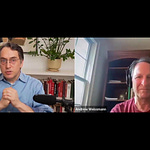Hi Folks,
I’m just back from spring break at NYU, and I wanted to return with something that, in these times, feels increasingly rare: good news. Yesterday, a federal judge issued a decision in the Eric Adams case that not only reaffirmed basic principles of justice but pushed back on a dangerous effort by the executive branch to exert pressure through the criminal legal system. It’s a ruling that underscores why independent courts matter. I wanted to break down what happened, what Judge Ho actually said, and why this case is so vitally important to all of us, far beyond New York City.
In this newsletter, I walk through the legal stakes of the DOJ’s attempt to dismiss the Adams indictment without prejudice—a move that, had it succeeded, would have left a sword hanging over the sitting mayor’s head, ready to be lowered at the administration’s discretion. Judge Ho was appropriately alarmed by that maneuver. His opinion rejects the government’s arguments—calling them out as appearing to be pretextual and incompatible with equal justice under the law. I’ll explain why this ruling matters beyond this case, how it protects those who refused to go along, and what it signals about the judiciary’s role in checking executive overreach.
–Andrew
TRANSCRIPT
Hi, folks. I haven’t done a video post for Substack in a while, so I’m glad to be back. It was spring break at NYU, and so I was off. And as I think a lot of you who are subscribers—whether free or paid—know, a lot happened, both in general for the nation and also with respect to me.
But I’m back in the saddle, and I want to talk to you about something really significant that happened yesterday.
I know that probably sounds like, well, a lot happened yesterday—but I want to focus on a court decision. And unlike a lot of things that have been happening lately, this is actually good news. It’s an example of the courts continuing to do the right thing—holding to the rule of law.
The reason I think it’s so important is that if this decision had come out differently, it would have dramatically increased the power of the Trump executive branch to bend people to their will. That’s already significant—but this took away a really vital tool. So it’s an incredibly important decision.
This is the decision by Judge Ho (H-O) in the Southern District of New York in connection with the Mayor Eric Adams case.
Let me give you a “level set,” as they say in Washington, on what the case was about.
Just to remind people: Eric Adams, during the Biden administration, had been charged in the Southern District of New York with five felony counts, including bribery and various campaign finance-type charges. He had been awaiting trial and had made various motions, as any defendant is entitled to do.
Then the administration changed. Eric Adams is reported to have gone on a bit of an effort to have Donald Trump issue a pardon—which he did not do. Instead, the current executive branch, through the Department of Justice, moved to dismiss the charges without prejudice. That’s the key part—without prejudice.
When they made that motion, it caused quite a stir within the DOJ. As folks will remember, the head of the Southern District of New York U.S. Attorney’s Office resigned. She had a very public letter that she sent to Attorney General Pam Bondi, explaining why she thought this was an improper move—an inappropriate use of the criminal law to bend a local official to their will.
As she said, it was a quid pro quo—in her view, to dismiss the case, but to do so only, essentially, on the condition that he adheres to the federal immigration policies of the current administration.
That’s the key issue here: the idea of using the criminal law to bend someone to their will—to get them to do what the administration wants. And remember, this is a public official in a locality near the largest city in America: New York City. But it could be true of anybody. It could be a federal official, a member of Congress, a major corporation.
This was the main idea that led Danielle Sassoon, the head of the Southern District of New York, to say: No way I’m signing on to this. She thought it was a blatant quid pro quo—or what she called “tantamount to a quid pro quo.” She said it happened at a meeting between Eric Adams’s counsel, Emile Bova (then the Acting Deputy Attorney General), and various members of the SDNY U.S. Attorney’s Office.
Famously, that’s a meeting where career people took notes—and Emile Bova is reported to have ordered that those notes be left behind. So we don’t know what those notes say. Presumably, they would back up Danielle Sassoon’s account. (It should be noted that Emile Bova and Eric Adams’s counsel have denied that this was a quid pro quo—but that’s the state of the record.)
So you have this motion to dismiss the case without prejudice—which, if granted, would mean the government could at any time, and for any reason, reinstitute those charges. That’s the so-called choke chain the government would have on this public official, because the case could always be reinstated if he was “displeasing” them in some way.
There were various statements by Trump officials that suggest they understood this was essentially the arrangement. And various other people resigned as well—folks in the Public Integrity Section in Washington, people who prosecute public corruption cases for a living—refused to sign on to this. So it was, to state the obvious, a big deal.
This is—it’s, to state the obvious—not normal. It just is not normal to see career people resigning.
So, the next part of the story is that a few weeks later, Eric Adams made a motion that you think he would’ve made earlier, which was to say that the case should be dismissed with prejudice. And that, obviously, is a better outcome for him because the case can’t be re-instituted. But it also removes the choke chain.
And that’s the key sort of problem with what the government was trying to do here. That all set up the issue of what Judge Ho should do with this motion—this pending motion by the government saying dismiss without prejudice, Eric Adams first joining with that, but then later saying dismiss it with prejudice.
The judge asked an amicus—a friend of the court—to file a brief. That was Paul Clement, a noted Supreme Court advocate, traditionally aligned with more mainstream Republican causes. And he said the case should be dismissed with prejudice, not without.
And so Judge Ho issued his decision yesterday. I highly recommend it. It’s quite lengthy, but I’m going to read some key parts of it.
I think the most important thing for people to remember is that Judge Ho, under the rules, had very, very limited discretion. Because many people listening might be thinking: Well, why didn’t he just deny the government’s motion altogether and require that the case go forward?
And the answer to that is: under Rule 48 of the Federal Rules of Criminal Procedure, it is really hard for a judge to do that.
Here’s just a practical reason: the executive branch are the prosecutors. So, if you order them to go forward and say, I’m not dismissing the case, they can just say, Well, we don’t want to. Or they can do a really half-assed job. Or they can slow-walk the case. I mean, it’s really hard for a court to force a case to go forward when the prosecutors don’t want it to.
Second, I think Judge Ho would have been reversed by an appellate court. Because that issue—who to prosecute and when to prosecute—has traditionally given enormous, enormous leeway to the executive branch. So, the court taking that on would’ve been highly likely to be reversed.
So, as a practical matter—as he articulates in the opinion—his only real choices were with prejudice or without prejudice.
Ultimately, what he decided was that this case would be dismissed with prejudice. And he rejected the government’s position that it should be without prejudice—that they should keep that choke chain.
But in doing so, he used, I think, fairly excoriating language about what was going on here.
First, he tackled the first ground the government gave: that there was an “appearance of impropriety” because of the timing of the charges. The allegation by Emile Bova and the government’s submission was that the indictment was brought too close to the primary.
The judge refutes that—and says there’s nothing at all about the timing that’s unusual. In a pretty damning part of the opinion—and I’m just going to read it to you—the court sums up its analysis of that first ground:
“In fact, the timing of this case is entirely consistent with prior public corruption prosecutions. All of this suggests that the appearances-of-impropriety rationale is not just thin, but pretextual.”
That’s a pretty good summary of where he is. And that is fairly scathing language—especially when you have the Acting Deputy Attorney General making the argument, and the court finding that it suggests it’s pretextual.
Then the court goes on to talk about the second rationale, which was that dismissing the case would help the mayor with immigration enforcement—specifically the federal immigration enforcement protocols.
First, the court says there’s nothing about the pending case that interferes with the mayor’s ability to enforce immigration laws. He’s been doing it—and said he would do it—even while under indictment.
So, the court finds it really has nothing to do with the case.
But the real issue is the quid pro quo—the choke chain that dismissing the case without prejudice would create.
And here again, reading from the decision:
“Everything here smacks of a bargain—dismissal of the indictment in exchange for immigration policy concessions.”
I’m going to read that again:
“Everything here smacks of a bargain—dismissal of the indictment in exchange for immigration policy concessions.”
Continuing—this is me doing my best Rachel Maddow voice (obviously, she reads better than I do, but here’s my weak imitation)—still quoting:
“Taking a step back from the particulars of this case, DOJ’s immigration enforcement rationale is both unprecedented and breathtaking in its sweep. DOJ cites no examples, and the Court is unable to find any, of the government dismissing charges against an elected official because doing so would enable the official to facilitate federal policy goals.”
“DOJ’s assertion that it has ‘virtually unreviewable’ license to dismiss charges on this basis is disturbing in its breadth—implying that public officials may receive special dispensation if they are compliant with the incumbent administration’s policy priorities. That suggestion is fundamentally incompatible with the basic promise of equal justice under the law.”
You now see why I am particularly heartened by Judge Ho’s decision—and why it’s so important. Because he’s getting at this idea of using the criminal justice system to get people to adhere to an administration’s policy preferences.
That’s the reason—and the court notes this—that so many career people refused to be part of this. And you can also see how dangerous this power is—it’s like the loaded gun in a Chekhov play. Except in this case, we know for sure that it will be used—probably far more than Chekhov’s gun ever was.
So this was a hugely important decision, rejecting the government’s ability to do this.
Does it completely prevent the government from trying this tactic in the future? No. This is just one district court judge. It remains to be seen whether the government will appeal—or whether they’ll try the same approach in other courtrooms.
Finally, some of you might be wondering: What happens to Eric Adams if this case is dismissed with prejudice?
Well, it pretty much ends the case—federally. The government had previously said that the SDNY was going to bring a superseding indictment (i.e. other charges). That obviously isn’t going to happen now.
What’s worth watching is whether Alvin Bragg, the sitting District Attorney in Manhattan—who has, in the past, brought cases when the federal government stepped away—picks this up. There are legal challenges to that, but it’s something to keep an eye on.
To me, although it’s hard to say this—it’s obviously a big deal; it’s my mayor—and there should be accountability. He should have his day in court. The public is entitled to see this go forward, in my view.
But that’s not really the big picture here.
The bigger issue is the tool the government wanted to use—and that the court refused to go along with.
Final point before I end: I think the judge did a really good job of protecting the people who resigned rather than go along with this. He pointed out that he completely understood their concerns—he has those same concerns.
Because it’s worth remembering: Emile Bova had said those people wouldn’t be targeted, but would be subject to an investigation for refusing to go along with this.
So now, those career people have a court decision they can point to—saying, “It wasn’t just me. A federal judge raised the same red flags I did.”
And the same concerns about what it would mean for our democracy—and the abuse of power.
I wanted to foot-stomp what happened yesterday. Because, you know, there are floodgates—actual floodgates—of news and new outrages every day.
But this? This is an important decision.
And in an era filled with bad news, it’s good to see that yet another federal judge is adhering to the rule of law.
Hopefully, that’s a model for all of us.
Thanks so much for listening—I’ll be back with you soon with more posts. Take care.











